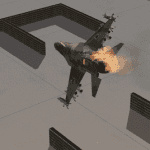|
 Gandhi is a game about non-violent protests, police brutality, religious tensions and deadly terror happening in India all at once for thirty years. Check out the publisher page for the complete rulebook and playbook, a high-resolution map, development articles etc. The British Raj is trying to hold onto the imperial glory and put out fires all over the subcontinent. The fires are lit by Revolutionary cells made of pure petrol. In the middle, the Indian National Congress is suggesting maybe talking about it, while its Muslim members are jumping off this ride to the All-India Muslim League promising a piece of India just for them. Page 29 of the Playbook hides the most important chart of all, showing the main ways the factions affect each other. 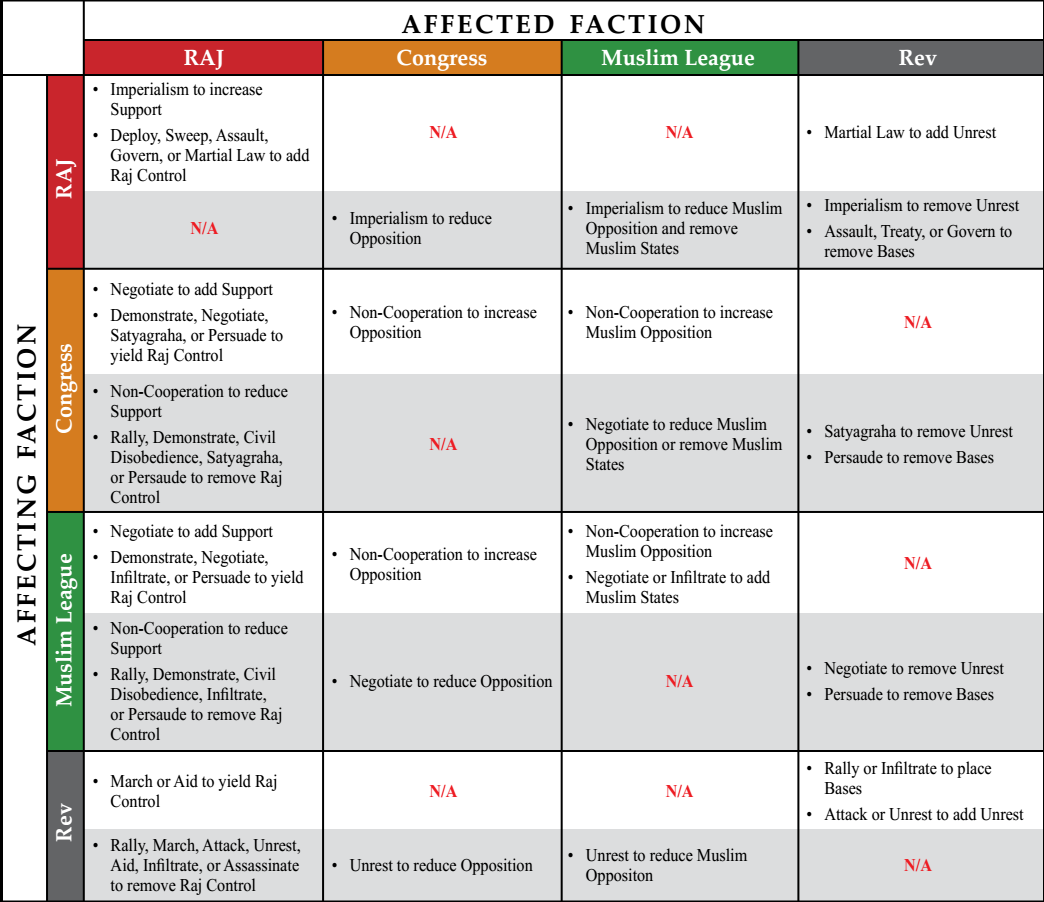  I'll be introducing the rules and systems as they become relevant, but I did record a couple of shakycam explanation videos a year ago as an intro: an overview and specific actions. There's a minor mistake in the second one, but it works. The actual play will run in Tabletop Simulator. 
|
|
|
|

|
| # ? May 2, 2024 10:57 |
|
==01== <-link <-linkI'll fix the few bot-running mistakes next time. 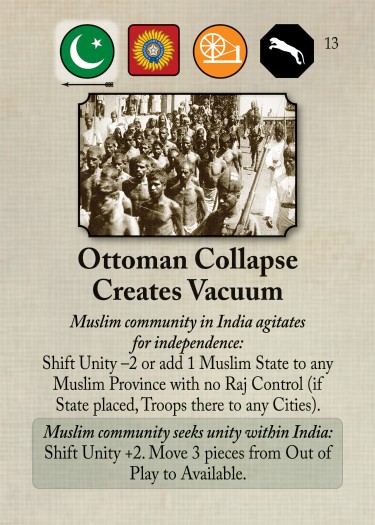 quote:The end of World War I brought an end to the Ottoman Empire, once the largest and most powerful Muslim empire in history. The last Ottoman Sultan was also the last Caliph, or political ruler of all Muslims. In India, 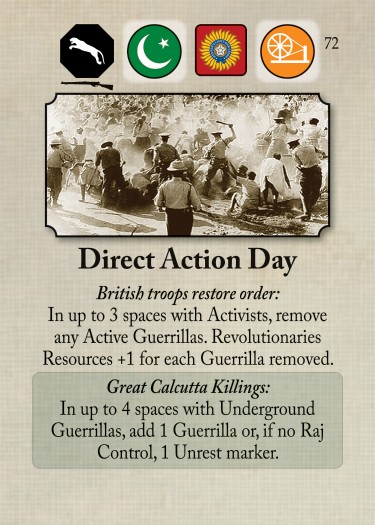 quote:In 1946, the Muslim League called for a Direct Action Day to protest the formation of an interim government without League approval. Hindu-Muslim tensions were already high across India. They erupted into violence in Calcutta. Over several days of rioting, 4,000 were killed. The split between Hindu India and Muslim India was irreparable, partition was inevitable.
|
|
|
|
How does Gandhi compare to other COIN games? I’ve only played Andean Abyss and A Distant Plain myself.
|
|
|
|
Well, Gandhi has no momentum or capability cards. I haven't seen ADP, but the first few COINs stuck to counterinsurgency manuals they were based on, so the government governed nicely to make people like it, and insurgents only got their supporters through terror and agitation. Later games, like Colonial Twilight, throw in some state terror, and in Gandhi you get Raj's Martial Law with elimination of passive activists and political suppression in one package. The non-violent factions are a new concept; they even redesigned the upcoming volume about the Philippines to use the mechanics.
|
|
|
|
*video LP* 
|
|
|
|
SelenicMartian posted:Well, Gandhi has no momentum or capability cards. Batista’s government in Cuba Libre can use terror, but only to remove opposition and since it’s a historical dictatorship few people are going to care. ADP was the first to have multiple counter-insurgent factions, and NATO can forcibly include the ANA in its operations. Andean Abyss would be a much different game if it came out now, and there’s a prequel expansion planned to cover the ‘80s where government corruption is supposed to be an important mechanic.
|
|
|
|
I see why you didn't try to make the thread play this.
|
|
|
|
EasilyConfused posted:I see why you didn't try to make the thread play this. Username/post combo. I've always been interested in COIN games, but my group would throw it at my head if I tried to get it to the table.
|
|
|
|
I have never heard of COIN games. I'm not sure how much I'd like it in a regular setting, I don't like games where you can spend a lot of thought thinking about how to screw over other players. Some friends are better about dealing with that than others. But with the right crowd, I get the feeling I'd really enjoy this.
|
|
|
|
OneWingedDevil posted:I have never heard of COIN games. I'm not sure how much I'd like it in a regular setting, I don't like games where you can spend a lot of thought thinking about how to screw over other players. Some friends are better about dealing with that than others. But with the right crowd, I get the feeling I'd really enjoy this. You need to play to win, not to make everyone else lose, so focusing on eradicating another faction just means you’ll both lose. And while some of the games have hard alliances you can work with whomever you need to. Anyone who holds a grudge won’t do well.
|
|
|
|
And of course, another map where Sikkim just doesn't exist. edit so I'm not just complaining about maps: It was kind of neat how the Muslim League taking over Bengal seemingly led to the Day of Action (though maybe it all happened in Madras). So what happens if no spaces could fit the event? Is it just ignored, or do you draw another one? Kangra fucked around with this message at 06:31 on Sep 2, 2021 |
|
|
|
Everyone's free to ignore an event and do ops, or make a deal with another player and play the event benefiting them in exchange for not getting your activists in Bihar arrested next turn or something.
|
|
|
|
==02==  quote:The end of British rule and the subsequent partitioning of India into Hindu and Muslim nations led to violence and bloodshed on a staggering level. Throughout India, communities that had been integrated for a thousand years were ripped apart. Calcutta, the site of communal bloodshed in 1946 (Card 72), was in the midst of rioting in 1947 when Gandhi undertook a four day fast that halted the violence. 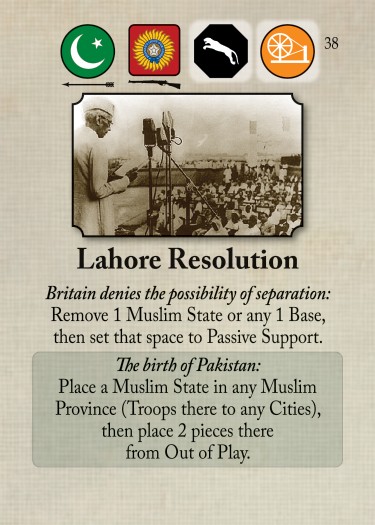 quote:The long simmering dream of a separate Muslim state become the ofcial position of the Muslim League at its general session in Lahore in 1940. With WWII raging in Europe and soon to engulf Asia, the Muslim League broke 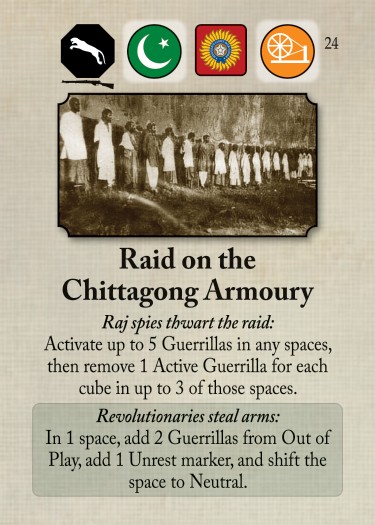 quote:In 1930, 65 revolutionaries led by Surya Sen assaulted Chittagong in East Bengal. They captured both the police armoury and the auxiliary force armoury, but failed to locate any ammunition. The small army fled into the Chittagong hills, where there were surrounded by several thousand British troops. After a gun battle in which twelve revolutionaries and 80 troops were killed, Sen led his men into hiding among nearby villages. He was fnally found, convicted, and hanged three years later. 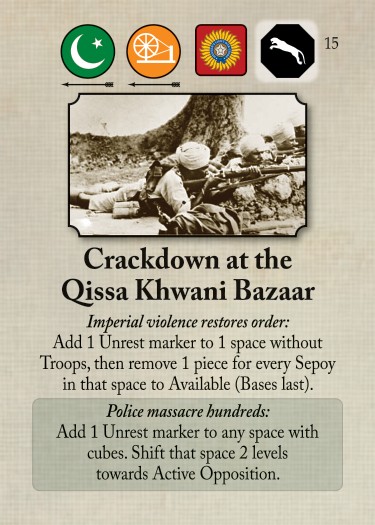 quote:In 1930, following the arrest of Pashtun nonviolence leader Khan Abdul Ghaffar Khan (Card 17), protesters gathered in the Qissa Khwani Bazaar in Peshawar, in the Northwest Frontier Province. Troops of the British Indian Army arrived. The Khudai Khidmatgar (Card 39) protesters refused to yield. After a tense standoff, the troops opened fre on the crowd. At the time it was reported that 20 had been killed. Later estimates put the number in the hundreds.
|
|
|
|
In the British step where you rolled the die and compared it to the number of active troops to determine the special operation, it stated that the die needed to be less than or equal to the die, not less than. I think there were 4 active troops out on the field so it would pass the condition, unless that was referring to 4 troops in one province.
|
|
|
|
Exactly, that’s the mistake I mentioned in the video description.  The British turn should have been limited to dropping a dozen pieces into cities, so they couldn’t have blocked my activist rants either way.
|
|
|
|
==03== The dreaded campaign round is upon us.  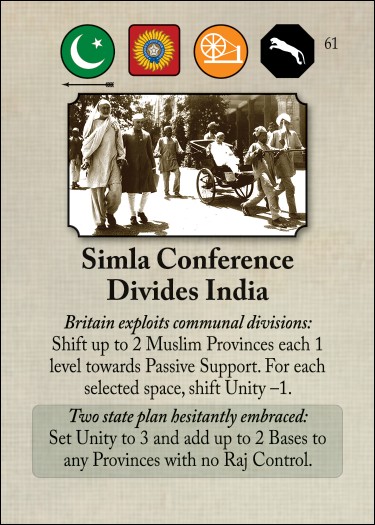 quote:Soon after the end of WWII, the Simla Conference was held in India to discuss the end of British occupation. The issue of partition dominated the discussions and ultimately the conference stalled without a clear timeline for independence. Next in the cards we've got some events matching the new viceroy.
|
|
|
|
==04== The action resumes! Take a shot whenever a card says "Place a State."  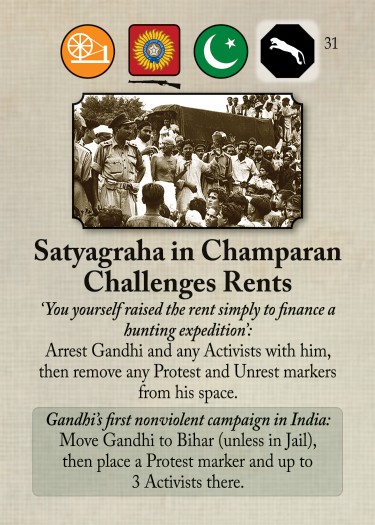 quote:Gandhi’s frst trial of the nonviolent techniques he had developed during twenty years in South Africa came in 1917. Invited to Champaran to investigate the plight of indigo farmers, Gandhi engaged in successful civil disobedience that gathered national attention and secured British agreements to relax the demands of the landlords. Emboldened by this success, Gandhi felt ready to call for nationwide civil disobedience in response to the Rowlatt Act (Card 26) two years later, a move he later called his “Himalayan mistake.” 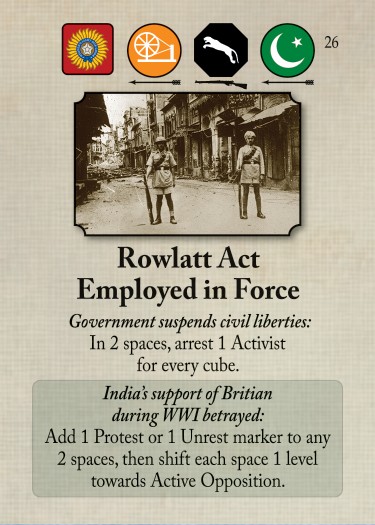 quote:The Anarchical and Revolutionary Crimes Act of 1919 was better known as the Rowlatt Act after the British judge who recommended that authoritarian measures were necessary to curb revolutionary activities in India. This legislation gave British authorities broad powers to arrest and detain suspected revolutionaries, and was quickly denounced by Congress leaders. Gandhi called for a hartal, or nationwide civil disobedience, in response. Rising tensions led to the massacre at Jallianwala Bagh (Card 9), an event that led to the repeal of the Rowlatt Act in 1922. 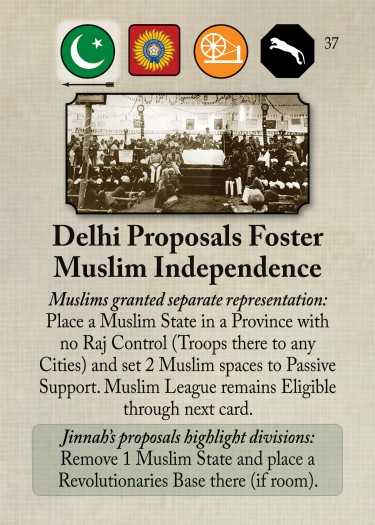 quote:By the 1920s, Congress was split between nationalists, who favored a pan-Indian identity, and communalists, who sought to preserve centuries old ethnic and religious communities. Meetings between Congress leaders including Nehru (Card7) and Jinnah (Card 18) in 1927 produced the Delhi Proposals, aimed at preserving the Hindu majority while guaranteeing a place for Muslims. Jinnah later rejected the proposal and issued his own Fourteen Points, a document that pointed the way to the later partition of India in 1947. 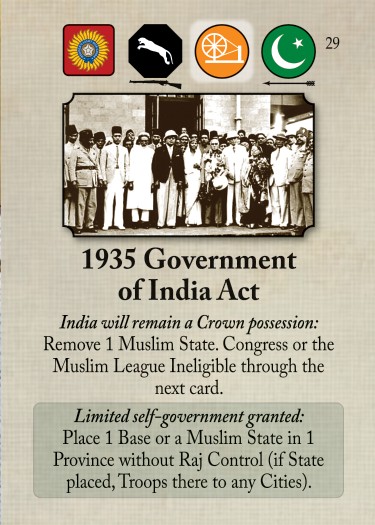 quote:The 1935 Government of India Act replaced the similarly named 1919 Act and, in theory, introduced the possibility of federal power sharing in India. The British would retain control of the national government, but provincial power would be given to elected Indian politicians. In the 1937 elections, Congress won power in eight of eleven provinces. Ultimately, however, the promises of the 1935 Act were unrealized. Congress ofcials quit their posts en masse to protest the entry of India into WWII in 1939, and the poor showing by the Muslim League may have convinced Jinnah to fully embrace partition (Card 38).
|
|
|
|
==05== These are the most chill Revolutionaries I've ever seen. They're mostly using the power of friendship.  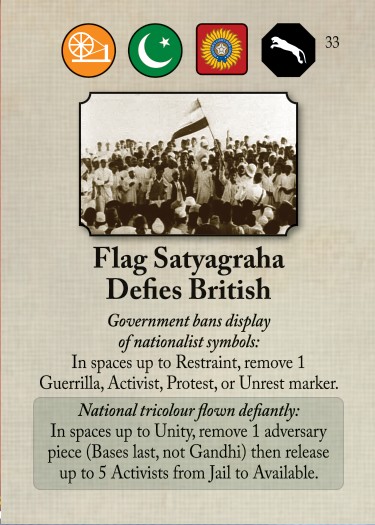 quote:The Raj government had made it a crime to display nationalist symbols, which of course made it easy to participate in civil disobedience simply by flying any nationalist flags. The tricolour-spinning-wheel flag, frst proposed by Gandhi in 1921, gained prominence when it was displayed en masse in Nagpur in 1923 during the Flag Satyagraha. 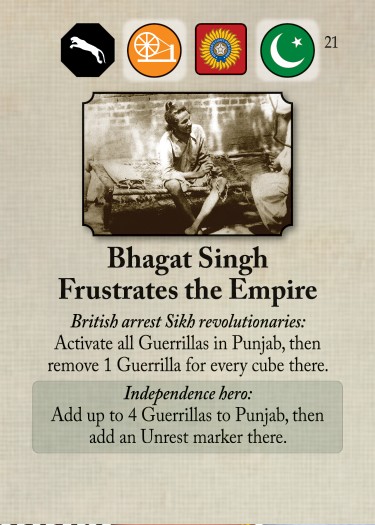 quote:Bhagat Singh was a revolutionary fighter who had perhaps a bigger impact on the independence movement after his death than during his life. In 1928, Singh and other members of the Hindustan Socialist Republican Association (Card 44) killed a British police ofcer, John Saunders. A year later, Singh was arrested for the Central Assembly bombing (Card 19), and while in custody was convicted of the earlier murder. He was hanged in 1931. To this day, Singh remains a controversial fgure: remembered by some as revolutionary martyr, by others as a terrorist. 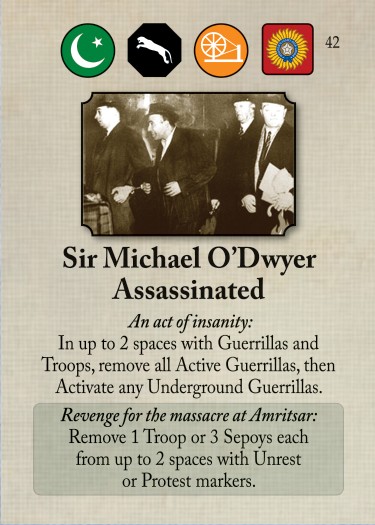 quote:O’Dwyer was Lieutenant Governor of Punjab in 1919 when the Amritsar massacre occurred (Card 9), afterwards remarking that General Dyer’s actions that day had been correct. Many held him responsible for the massacre, including Udham Singh. In 1940, Singh traveled to London, cornered O’Dwyer outside Caxton Hall, and shot him dead. 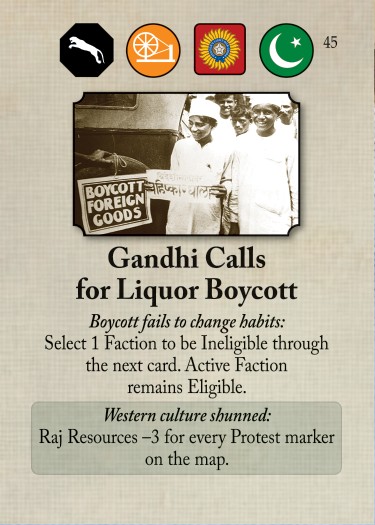 quote:Refusing to purchase British goods as a form of non-cooperation was a powerful nonviolent tool to bring pressure on the Raj government. During the campaigns of both 1921 and 1930, Gandhi called for a nationwide boycott of British 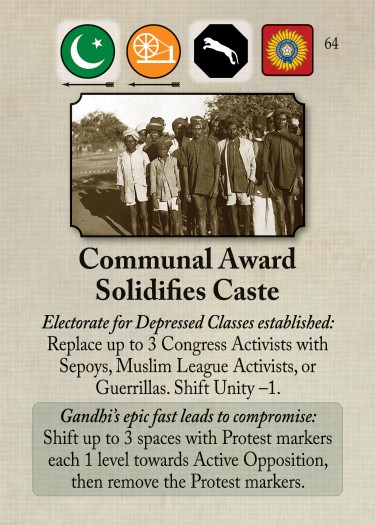 quote:The Second Round Table Conference (Card 27) established separate electorates for different religious and caste groups in India. Gandhi objected to the legal separation of Untouchables and undertook his Epic Fast, which lasted six days. The hunger strike ended when Gandhi and B.R. Ambedkar (Card 63) agreed in the Poona Pact that Depressed Classes would be granted guaranteed seats in the Indian legislature, but would not constitute a separate electorate.
|
|
|
|
I'm guessing outside of alternate viceroys, the factions don't really change around in how they're run, do they? Presumably Gandhi can't be kicked out of his own game. It does sort of seem like the Muslims are a bit more affected by the events, as if they expect that they wouldn't be the main side being played (and possibly why they need to adjust them).
|
|
|
|
When we hit crisis, all factions will get one enhanced ability. We'll have the most limited one  Kangra posted:It does sort of seem like the Muslims are a bit more affected by the events, as if they expect that they wouldn't be the main side being played (and possibly why they need to adjust them).
|
|
|
|
Having a bot to play tabletops games is a really novel thing to me, though this game seems really fiddly. I wonder how long would it take for the game to reach a conclusion if all players are bots. Space Kablooey fucked around with this message at 21:45 on Sep 27, 2021 |
|
|
|
I'm trying to get an idea for how the Congress and Muslim League interact. The idea seems to be that they are "toxic friends" - both use the same mechanisms and contribute to the same tracks, but the Muslim League is really building its own support and sometimes supports the Raj to keep the Congress down so it can take the win? Would that be accurate? It looks like the two non-violent sides are trying to ride Unrest but keep it down so it doesn't fire up the Revolutionaries, while the Revolutionaries are trying to maximise everything to make the whole country explode. Can the Congress and Muslims interact beyond stealing one another's Opposition, or is the idea to try and get the Raj player to do that for you?
|
|
|
|
Yes, the league wants its own space. We can persuade League pieces away, bases included, but that makes unity drop. Or we take them with us on demonstrations to help negate control. Also, we want protests, but not unrest, since unrest reduces both support and opposition.
|
|
|
|
SelenicMartian posted:A similar thing has happened to one of the upcoming games in the series, about the People Power Revolution. There was a faction that just didn't work as a playable one, so they removed it and rolled its few major acts into the card events. Is it still a three player game? Last time I checked the insurgent player controlled two factions, was one of those removed?
|
|
|
|
White Coke posted:Is it still a three player game? Last time I checked the insurgent player controlled two factions, was one of those removed? quote:First, the Moro faction has been removed from the game; instead of a joint NPA/Moro faction, the insurgent faction represents the NPA and other marxist-socialist insurgent and political forces. Got this sweet card design though 
|
|
|
|
SelenicMartian posted:Yes https://insidegmt.com/people-power-development-update/ Cool. I’m still waiting for their game about The Troubles. I heard it’ll have six factions.
|
|
|
|
White Coke posted:Cool. I’m still waiting for their game about The Troubles. I heard it’ll have six factions. https://www.compassgames.com/product/the-troubles-shadow-war-in-northern-ireland-pay-later/ GMT is preparing one about the British Way, and how it was made up. https://www.gmtgames.com/p-945-the-british-way-counterinsurgency-at-the-end-of-empire.aspx
|
|
|
|
==06== A gun under every bed, a grenade in every bag, Raj units turning around and opening fire on former comrades in arms then disappearing in the hills - even Gandhi can't do poo poo in Punjab.   quote:Background. Violent resistance to British rule was often scattered and small scale, compared with the violent insurgencies in Colombia, Cuba, Vietnam, and Afghanistan. British police forces in India kept close tabs on revolutionary groups and British jails, especially the Cellular Jail (Card 32), were filled with political prisoners. 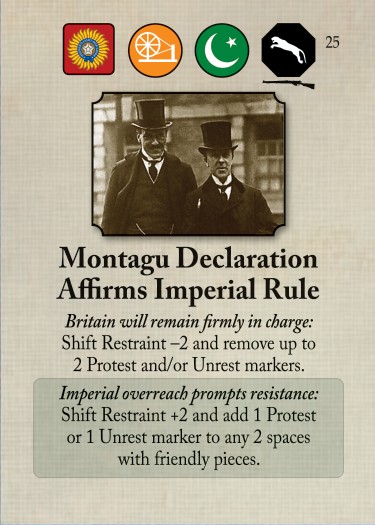 quote:Secretary of State for India Edwin Montagu released a statement in 1917 that “the policy of His Majesty’s Government is that of the increasing association of Indians in every branch of the administration.” It was criticized by both British imperialists and Indian leaders alike. 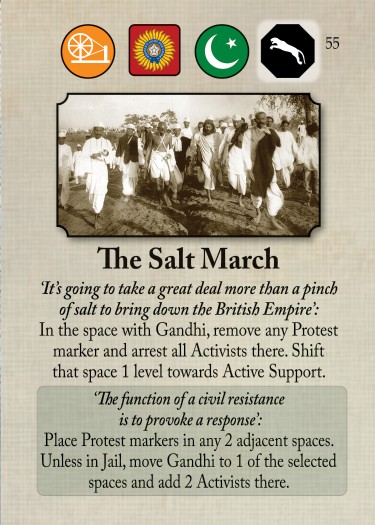 quote:Gandhi’s most famous act of civil disobedience exemplified the sophisticated techniques of nonviolent resistance that he had been practising for 35 years. He first wrote to Viceroy Lord Irwin and detailed the planned march; if Lord Irwin would discuss changing the salt laws, Gandhi offered, he would postpone the march. Predictably, the letter was ignored. Gandhi planned the route carefully so that it would take roughly three weeks to walk the 240 miles to the ocean. He left his ashram with 80 followers and arrived with 50,000. The act of civil disobedience itself, gathering salt that had collected in shallow pools along the water’s edge, was so simple that anyone could participate. Moreover, salt was important to every Indian: it cut across ethnic and religious divisions. To defy the British by collecting salt was both highly symbolic, but also very practical. 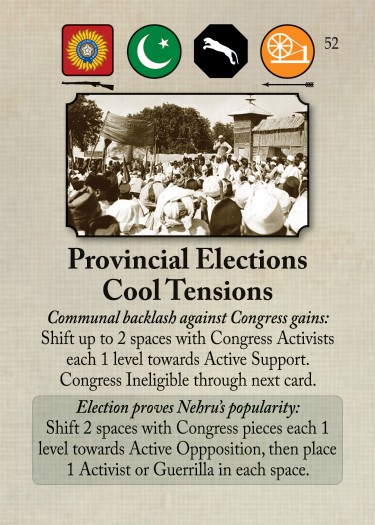 quote:Elections for provincial government posts were held in eleven provinces in 1937, as promised by the 1935 Government of India Act (Card 29). Congress gained power in eight provinces, but the Muslim League did poorly. Regional parties in Sind, Bengal, and Punjab did better than either Congress or the Muslim League, proving that the communal split within Indian politics remained strong. 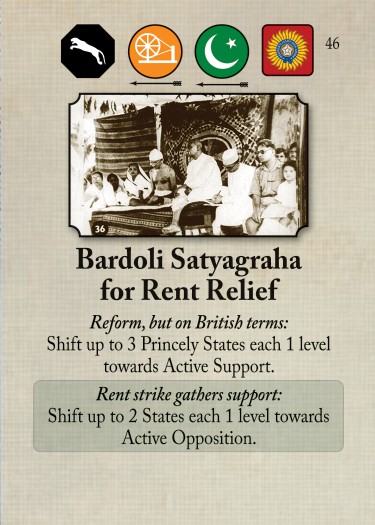 quote:In 1928, farmers hit hard by famine and crop failure organized a civil disobedience campaign and refused to pay taxes that had been raised 30% during the crisis. After several months, the local government relented and eliminated 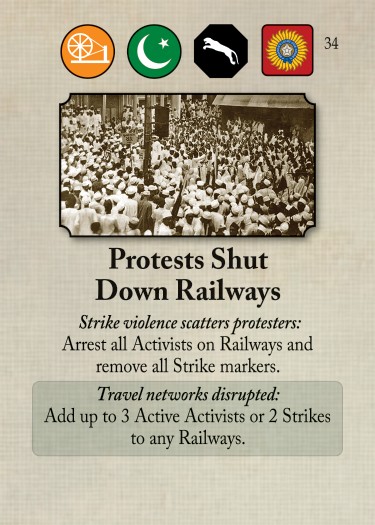 quote:India had always been a resource colory for Great Britain, and the railway network was the principal means of transporting those resources out of India. Although there were sporadic attacks on individual trains, such as the Kakori Robbery (Card 23), during nationwide civil disobedience, such as during the Quit India Movement (Card 36), the railway network itself was targeted, with non-cooperation strikes that shutdown stations and blocked tracks.
|
|
|
|
==07== The ticking time bomb(s) for the next season are the Revolutionaries. And I thought they weren't doing much.  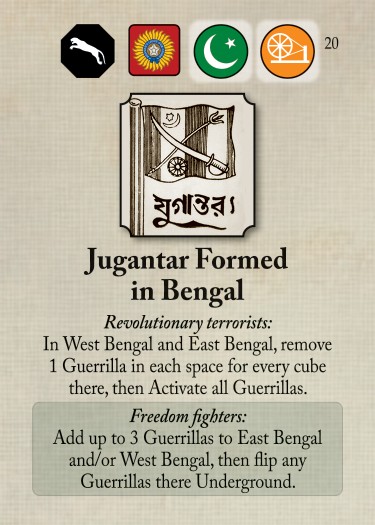 quote:Jugantar was an early anti-colonial revolutionary group that was established in Bengal in 1906. After a failed attempt during WWI to overthrow British rule with German aid (the so-called German Plot), Jugantar for a time adopted nonviolence and supported Gandhi’s Non-cooperation Campaign of 1920. Weakened by the arrest of key leaders, and fractured by competing sects within the group, it ofcially merged with Congress in 1938. 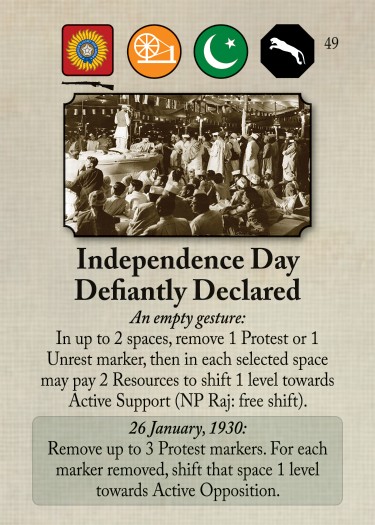 quote:After Congress passed a resolution at the end of 1929 calling for the total independence of India from Great Britain, Congress organized an independence day celebration for January, 1930. Although mostly symbolic, the act foreshadowed the important events of 1930 including the Salt March (Card 55) and Dharasana Raid (Card 12). 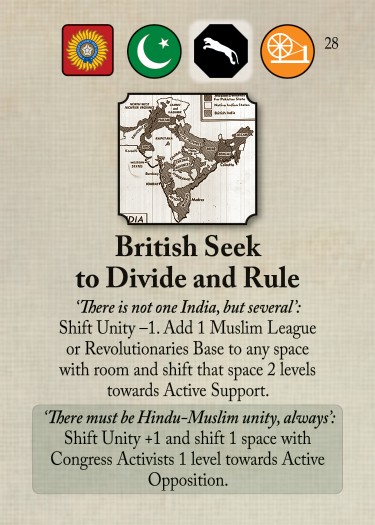 quote:Thousand year old tensions between the Hindu and Muslim communities in India provided the Raj government opportunities to keep Indians divided. While Gandhi was critical of British policies that formalized divisions in law such as
|
|
|
|
I think in one of the previous videos you mentioned a COIN discord. I haven't found links on the games' pages on GMT's website so is there a way for people to join publicly or am I just misremembering?
|
|
|
|
Their monthly newsletters have the Discord links now. This is the COIN one https://discord.com/invite/3nBMzpB The general GMT is way less active. By the way, the COIN engine is being wrestled to cover several decades of Cross Bronx Expressway. Intense trailer https://www.youtube.com/watch?v=Ui9KdLI6FNs https://www.gmtgames.com/p-953-cross-bronx-expressway.aspx
|
|
|
|
Thanks for the link. You didn’t finish talking about the Gandhi sequel. I know they were planning a sequel for Cuba Libre, and a prequel for Andean Abyss, and I think they released one for Fire in the Lake.
|
|
|
|
==08== We start with the Gandhi sequel card, followed by big surprises. A different kind of poo poo will hit the fan next time.   quote:After India gained its independence, it was expected that each princely state would in turn join the new nation as their former leaders renounced their power and privileges. One notable exception was the large state of Hyderabad. Indian troops invaded Hyderabad in 1948, resulting in the conquest and annexation of the state and the deaths of tens (perhaps hundreds) of thousands. 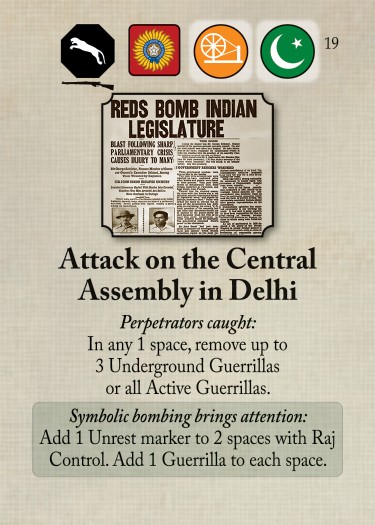 quote:In 1929, Batukeshwar Dutt and Bhagat Singh (Card 21) threw leaflets and two bombs into the Central Legislative Assembly building in New Delhi to avenge the death of Lala Lajpat Rai (Card 47). Both men were quickly arrested, put 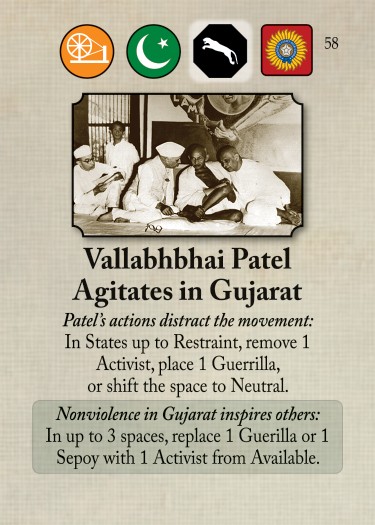 quote:Though he was raised in nearby Telangana, Patel became associated with Gandhi’s home state of Gujarat because of his critical leadership during the successful nonviolent movement of 1928 (Card 46). Patel became one of Gandhi’s most trusted lieutenants, and ultimately played several important roles in the government of India after independence. 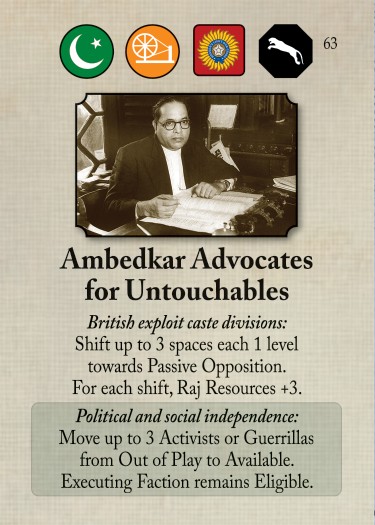 quote:B.R. Ambedkar was a lawyer and outspoken critic who actively sought to expand rights for Untouchables. He made the Poona Pact with Gandhi in 1932 (Card 64) that guaranteed representation for Depressed Classes. After independence, he became the leader of the Dalit Movement, which saw half a million Untouchables convert with Ambedkar to Buddhism rather than continue to live as non-caste Hindus.
|
|
|
|
==09== Congress collaborating with the Raj to eliminate opposition? Never! Well, a just little.  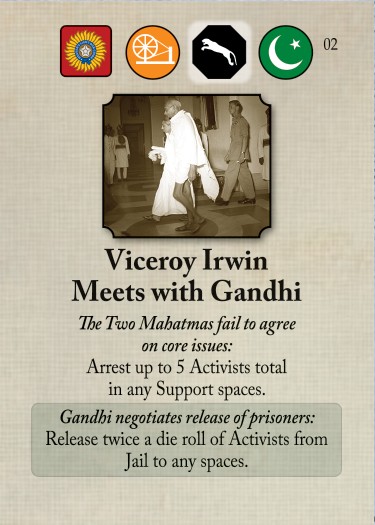 quote:In 1931, a year after The Salt March (Event 55), Viceroy Lord Irwin met with Gandhi in an attempt to convince him and Congress to participate in the upcoming 2nd Round Table Conference (Event 27). While the government agreed to 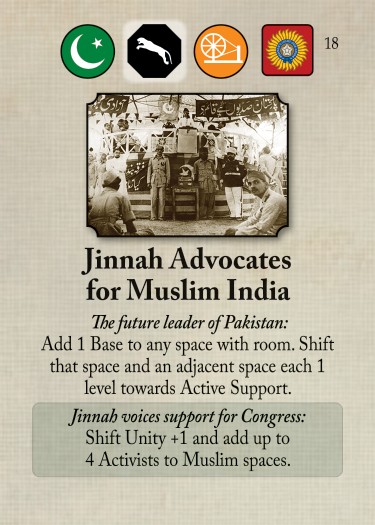 quote:Born in 1876 in Karachi, Muhammad Ali Jinnah was the leader of the Muslim League from 1913 until the establishment of Pakistan in 1947. Though he originally advocated Hindu-Muslim unity, Jinnah later came to see partition and a 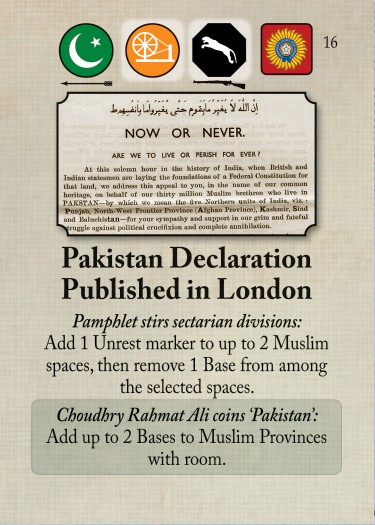 quote:Released in 1933 during the Second Round Table Conference (Card 27), Choudhry Rahmat Ali’s pamphlet was subtitled Now or Never; Are We to Live or Perish Forever? It was the first time that the term Pakstan (later Pakistan) was used in print. 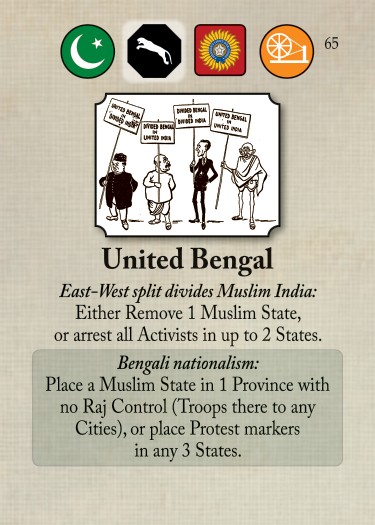 quote:Bengal was first partitioned by the British in 1905 into a Muslim-majority East and a Hindu majority West. The move was very unpopular and sparked a Bengali nationalist movement that shocked the government. Although partition was reversed in 1911, the religious fault line running through Bengal would reappear in 1947, when British India was partitioned into Hindu India and Muslim Pakistan, which included East Bengal, (but not Calcutta). East Bengal would later gains its independence from Pakistan in 1971-72, becoming Bangladesh.
|
|
|
|
How would you rate the benefits and drawbacks the various factions get from being in a crisis? Who benefits the most, the least, &c?
|
|
|
|
The Congress gets to shift to opposition in spaces with Raj control. Control usually means there are enough Raj pieces there to arrest all of you on the next turn. So, not great. The ability to start a protest by demonstrating into a space with control would have been better. The Raj, on top of cheap operations, gets Martial Law in 2 spaces instead of 1. It allows arrests of inactive activists, at the cost of shifting the space to neutral, and unrest. This is kinda useless, unless the Raj is lucky to get the one viceroy whose martial law doesn't drop unrest. The League gets to Infiltrate states where it has activists and bases, without the Negotiate routine and a loss of opposition. That's just good, if they're prepared and have bases in 2-pop areas. But bases only cost 1 activist in a crisis, so it's all good. The Revolutionaries in a crisis get the cheapest Unrest op, the ability to place free bases by Infiltrate, and the ability to start unrest in areas where they have no presence at all if there are both green and orange activists there. No one else gets to just generate VP where they have no presence, outside of events. Crisis tends to be the "Revolutionaries running away with victory" time.
|
|
|
|
==10== We've gone from India splitting into states, to India filling up with revolutionary cells, to India being covered in unrest and opposition to the government, to hell where even with additional forces the Raj can't keep things from boiling over. 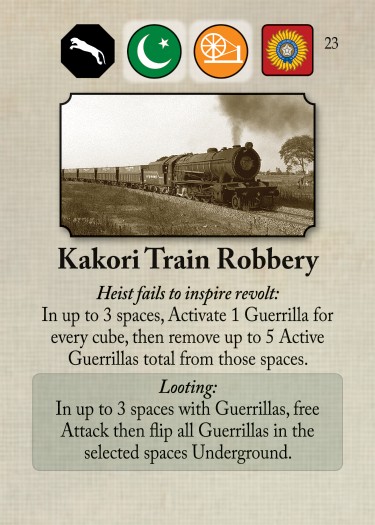 quote:In 1925, members of the Hindustan Republican Association (later the Hindustan Republican Socialist Association, Card 44) robbed a train on the Saharanpur to Lucknow line near Kakori in United Provinces. Some 40 were arrested in 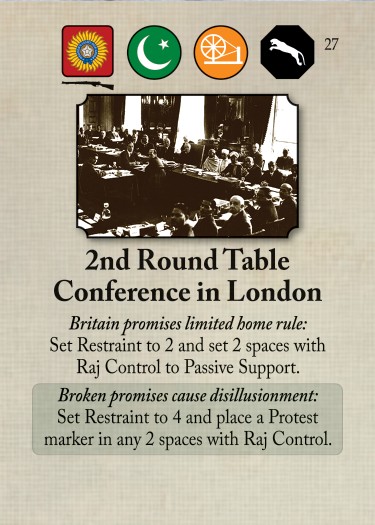 quote:The events of 1930, including The Salt March (Card 55) and Dharasana Raid (Card 12), led to the Second Round Table Conference in 1931. The Gandhi-Irwin Pact earlier that year (Card 2) helped guarantee Gandhi’s participation. 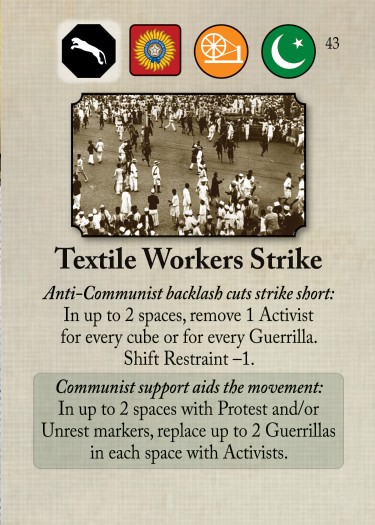 quote:The 1928 general strike of 150,000 textile mill workers in Bombay raised the possibility that the growing communist movement may join the independence movement. Ultimately this was prevented by harsh government crackdowns and communist leaders’ unwillingness to align with the nationalist cause. 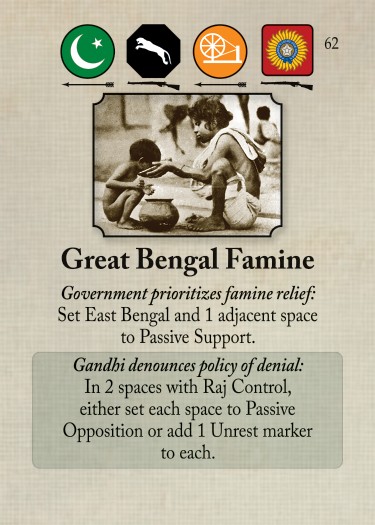 quote:One of the terrible tragedies of the 20th century, three million people were killed by the famine and spread of disease from 1943-1944. The causes of the disaster remaining controversial to this day. Many blame British wartime policies, such as those meant to deny Japanese forces in Burma access to resources, while others blame population growth and crop failure due to natural disasters in 1942-43. 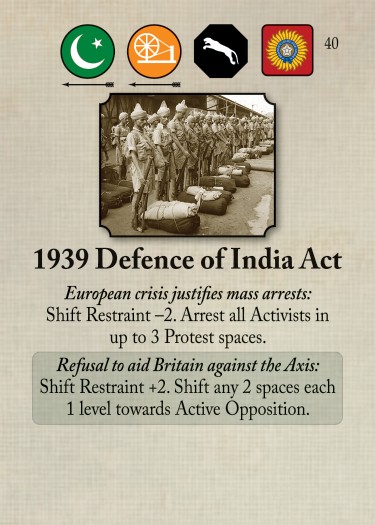 quote:Eager to quell the type of revolutionary activities that had spread in India during WWI (Card 20), the Raj government passed the Defense of India Act soon after the start of WWII. It gave British authorities additional wartime powers that were used during the Quit India Movement (Card 36), resulting in the arrest of 60,000 people within the first weeks of civil disobedience. 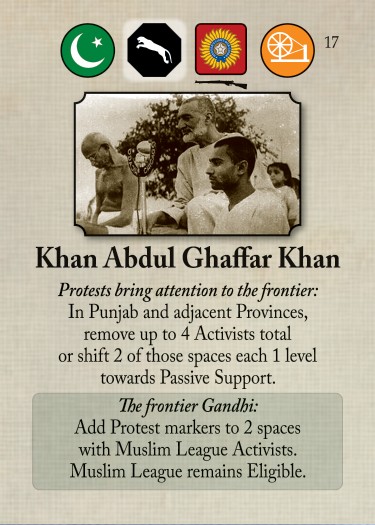 quote:Khan Abdul Ghaffar Khan was a devoted student of Gandhi’s methods of nonviolence, from Peshawar in Northwest Frontier Province. He led the Khudai Khidmatgars (Card 39) in their active, nonviolent resistance to British rule 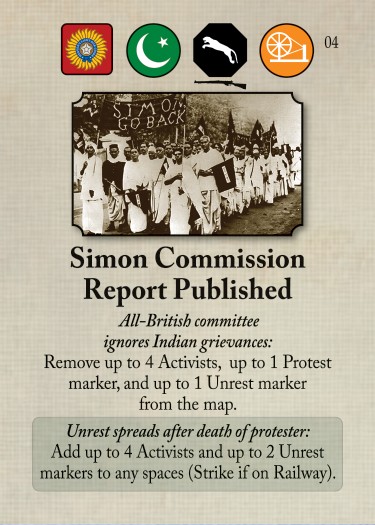 quote:The Indian Statutory Commission, known popularly as the Simon Commission after its chairman John Simon, was formed in 1927 to assess possible constitutional reforms that would give Indians greater representation in government.
|
|
|
|
Everything's going crazy now. Interesting to consider what a lack of Indian troops does for Allied forces in WW2. How is it handled if two or more factions have the VP to win. Does it depend on whose 'turn' it would be, or is there a joint victory? I'm not even sure what it would mean if both the revolutionaries and the Raj were to win. British departure considered 'justified' in the face of a region in chaos?
|
|
|
|
Kangra posted:Everything's going crazy now. Interesting to consider what a lack of Indian troops does for Allied forces in WW2. British occupation to fight the Indian version of War On Terror?
|
|
|
|

|
| # ? May 2, 2024 10:57 |
|
Coin games usually have a way to calculate who won the most if multiple factions win.
|
|
|



